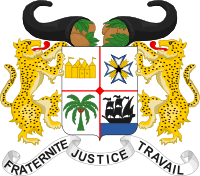Dahomeyan Democratic Union
The Dahomeyan Democratic Union (French: Union Democratique Dahoméenne, UDD) was a political party in French Dahomey.
 |
|---|
| This article is part of a series on the politics and government of Benin |
|
Government |
|
Parliament
|
|
Administrative divisions |
|
|
|
History
The UDD was established in 1955 by a merger of the Dahomeyan Progressive Union (UPD) and the African People's Bloc (BPA).[1] It aimed to be a nationwide party, but despite initially gaining support from across the country,[2] it quickly became identified as the party of the Fon of Abomey and Cotonou.[3]
The party failed to win a seat in the French National Assembly in the 1956 elections, and split into two factions later in the year over the issue of affiliation with the African Democratic Rally (RDA); former BPA leader Justin Ahomadégbé-Tomêtin became head of the dominant RDA faction, whilst Alexandre Adandé and former UPD leader Émile Derlin Zinsou headed the smaller UDD-Convention.[3]
Despite its internal problems and regionalised support base, the UDD emerged as the second-largest party in the 1957 Territorial Assembly elections, winning seven seats. However, the 1959 elections produced an unbalanced result; although the UDD received 44% of the vote, more than any other party, it won just 11 of the 70 seats in the Territorial Assembly, whilst the Dahomeyan Democratic Rally (RDD) won 22 seats with 17% of the vote and the Republican Party of Dahomey (PRD) took 37 seats, more than three times the number of the UDD.[4][5] Following the elections, accusations of fraud led to an agreement being reached with the PRD to redistribute nine seats.[5] Although this increased the UDD's seat tally to 20, it was still the smallest party in the Assembly.[4]
In elections held the following year, the Dahomeyan Unity Party, a merger of the PRD and the RDD, won every seat after President Hubert Maga changed the electoral system,[6] leaving the UDD without parliamentary representation. Following the elections, the UDD was banned on 11 April 1961 and Ahomadégbé-Tomêtin was imprisoned.[7]
References
- A propos de l’excellente chronique du Professeur Amoussou YEYE, contenu dans lnt La Nouvelle Tribune, 12 June 2009
- Manning, p. 278
- Patrick Manning (2004) Slavery, Colonialism and Economic Growth in Dahomey, 1640-1960, Cambridge University Press, p. 279
- Elections in Benin African Elections Database
- Mathurin C Houngnikpo & Samuel Decalo (2012) Historical Dictionary of Benin, Scarecrow Press, p. 286
- Houngnikpo & Decalo, p. 38
- Dictionary of African Biography, Oxford University Press, p. 139